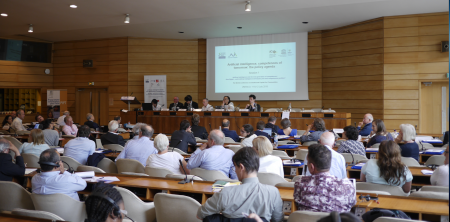The 15th Edition of the World Conference on Intellectual Capital for Communities
Artificial intelligence
and the next generation of competences :
How Digital – and Artificial Intelligence – will impact jobs and competences profiles?
July 11 & 12 , 2019
Organised by
The European Chair on Intellectual Capital, the University Paris-Sud
And UNESCO’s Intergovernmental Information for All programme (IFAP)

Final conference agenda
Conference report and speakers’ slides
You can download the speakers’s slides below.
Session 1
- Doreen Bogdan Martin, Director, Telecommunication Development Bureau of the International Telecommunication Union (ITU), Switzerland (Video message)
- Dominique Guellec, ‘AI in the Policy Agenda’, Head of Division, OECD Directorate for Science, Technology and Innovation, Organization for Economic Co-operation and Development (OECD)
- Bertrand Pailhès, Coordinator, French National Strategy for AI, France (talk)
- Takao Nitta, ‘Japan’s AI Strategy toward Society 5.0’, Director, Bureau of Science, Technology and Innovation Policy, Cabinet Office, Japan
- Maxim Fedorov, ‘The Role of Russia in Global AI Movement’, Professor, Director, Skoltech Center for Computational and Data-Intensive Science and Engineering, Russian Federation
Session 2 – keynote
- Leonard Nakamura, Emeritus Economist, Federal Reserve Bank of Philadelphia, United States of America, “Economic Growth Too Slow or Too fast: Measuring the Value of Intangibles and AI”
Session 3
- Valerio Dilda, “AI and the future competences”, partner, McKinsey, France
- Ekkehard Ernst, “Human vs machine intelligence – what’s at stake really?”, Chief Macroeconomic Policy Unit, International Labour Organization (ILO), Switzerland
- Nicolas Sabouret, “What AI can do and what it cannot do”, Université Paris-Sud, Université Paris-Saclay, France
- Wolfgang Baer, Mustafa Canan, Raymond Jones, Ben Carlton, Johnathan Mun and Thomas Housel: “Challenge for Acquisition of AI: An Econophysics Approach”, Naval Postgraduate School (NPS), United States
Session 4
- Jerome Morresey, Chief Executive Officer, Global eSchools & Communities Initiatives (GESCI), Kenya (talk)
- Federica Saliola, “The Changing Nature of Work”, Director, the World Development Report 2019, World bank report on next jobs, The World Bank
- Stefan Güldenberg, University of Liechtenstein, Liechtenstein, Klaus North, Wiesbaden Business School, Germany : “Tomorrow@Work: The Great Work Shift and What it Means for Our Lives”
- Ilmi Salminen, “Elements of AI”, Business Designer at Reaktor, Finland
Session 5
- Irene Kitsara, “AI and the digital divide”, Industrial Property Information Officer, World Intellectual Property Organization (WIPO), Switzerland
- Frédéric Caillaud, “Business models of the owners of core AI patents”, Director of innovation, National Institute of Industrial Property INPI), France
- Ahmed Bounfour, “Platforms and investment in IP for AI”, and colleagues; Professor, European Chair on Intangibles, Université Paris-Sud, Université Paris-Saclay
- Mark West, “I’d Blush if I Could: Closing the Digital Skills Gender Divide with Education and training”, UNESCO, France
Session 6
- Nathalie Smuha, « Ensuring Trustworthy AI – a fundamental rights-based perspective to AI governance » Assistant Lecturer and Researcher at KULeuven, Faculty of Law & EC High-Level Expert Group on AI (Video message)
- Bernd Stahl, “When AI, Big Data and Ethics converge”, Director of the Centre for Computing and Social Responsibility, De Montfort University, United Kingdom
- Thomas Baudel, “Ethics of AI, for researchers and practitioners “, Director of research, International Business Machines Corporation (IBM), France
- Irina Zoubenko-Laplante, “Technical and legal aspects relating to the desirability of a standard-setting instrument on the ethics of AI”, Section, Bioethics and Ethics of Science, Sector for Social and Human, UNESCO (talk)
Session 7
- Cécile Wendling, “Future of work and upskilling”, Group Head of Foresight at AXA, France
- Omar El Sawy, Kenneth King Stonier endowed Chair in Business Administration and Professor of Information Systems in the Data Sciences & Operations Department of the Marshall School of Business at the University of Southern California; Pernille Rydén, Associate professor, Technical University of Denmark, Denmark, “Real-Time Management: When AI goes Fast & Flow”
- Catarina Midoes, “Robots, ICT and their impact on EU labour markets”, Bruegel
- Colin de la Higuera, “Key digital and information literacy competencies for AI”, UNESCO Chair for training of teachers through OERs, University of Nantes, France
Session 8
- Mikhail Nasibulin, ‘National programme ‘Digital Economy of the Russian Federation’: how Russia Works with Knowledge and Information’, Director of the Department of Digital Economy Projects Coordination and Implementation, Russian Federation
- Svetlana Malkarova, ‘Overcoming Digital Inequality: Perspectives of Digital Volunteering Development’, Vice rector of the State University of Management, executive director of the UNESCO Chair ‘Societal, Legal and Ethical Frameworking of Knowledge Societies’, PhD, Russian Federation
- Alexandra Adaskina, ‘UNESCO Chair ‘Societal, Legal and Ethical Frameworking of the Knowledge Society”: Education for All Initiatives’, Russian Federation
- Pavel Terelyansky, ‘The Trap of Intellectual Capital Reproduction’, Advisor to the rectorate, professor of the Department of Information Systems of the Institute of Information Systems of the State University of Management, Russian Federation
Session 9
- Yann Menière, “Patents and the Fourth Industrial Revolution: the inventions behind digital transformation “, Chief Economist, European Patent Office (EPO)
- Noboru Konno, “Knowledge ecology and new organizational practices”, President at Japan Innovation Network, Japan
- Carolin Lin, “Digital Competences: Comparing Advanced Countries with Developing Countries“, The New Club of Paris & National Chengshi University
Session 10
- Hannu Piekkola, “Intangibles and labor-augmenting technical change”, University of Vaasa• Hannu Piekkola, “Intangibles and labor-augmenting technical change”, University of Vaasa
- Felix Roth, “Intangible Capital and Labour Productivity Growth: Panel Evidence for the EU from 1995-2015”, University of Hamburg
- Francesco Baldi, University of Turin, Lenos Trigeorgis, King’s College, “Valuing Human Capital Career Development: A Real Options Methodology”
- Keung Oui Kim et al., Université Paris-Sud, Université Paris-Saclay, “The contribution of ICT on productivity focusing on intangibles and interior/exterior ICT externalities”
- Alberto Nonnis et al., Université Paris-Sud, Université Paris-Saclay, “Analyzing the productivity contribution of intangible assets and participation in global value chains”